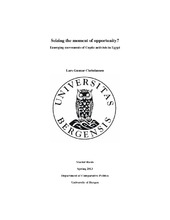Seizing the moment of opportunity? Emerging movements of Coptic activists in Egypt
Master thesis
Permanent lenke
https://hdl.handle.net/1956/7025Utgivelsesdato
2013-06-14Metadata
Vis full innførselSamlinger
Sammendrag
This thesis aims to explain the development of a Coptic secular movement in Egypt. By using social movement literature I produce a conceptual framework that emphasizes the three variables of opportunity structures, mobilizing structures and framing. I review the literature about the Coptic community and contentious politics in Egypt to supply my variables with context-sensitive indicators. The case of the Coptic community is situated as a case in a universe of similar communal groups in the Middle East, where the Coptic case is typical in terms of its size in relation to the majority, and the level of collective action. The Coptic secular movement is a recent phenomenon, and is thereby understudied. To my knowledge, this is the first contribution that analyzes Coptic collective action after 2011 with concepts from social movement theory. To sufficiently account for the Coptic secular movement I analyze how it has developed in recent history, revealing that the Copts have gone from relative isolation to be visible collective actors in the post-2011 context. The thesis relies on data from peer-reviewed journals, dissertations, and other academic publications that discusses the recent history of Egypt and the Coptic community. It also benefits from interviews with Egyptian Coptic activists, politicians, and scholars to shed light on the more recent developments. The analysis of historical and current Coptic collective action reveals a complex pattern of empirical relationships. The dominant role of the Church in political, social, and spiritual spheres of life is found to inhibit Coptic collective action. This role has historically been enforced by a patron-client relationship between the Church leadership and Egyptian regime. This elite alignment discouraged collective action directed both against the Church and the regime. The inclusion of the Coptic upper class in the patron- client network of the Egyptian regime also prohibited resources to flow downwards to potential grass root mobilizers. With the gradual decline of the church-regime alliance and the persistence of Coptic grievances, collective action became a viable option in the 2000s. With the complete reshuffle of Egyptian politics in 2011, the secular Coptic movement eventually found its place in the national opposition against the Muslim Brotherhood and Mohamed Morsi.
